Israel Seeks Alliance Against Iran Following Drone, Missile Attack
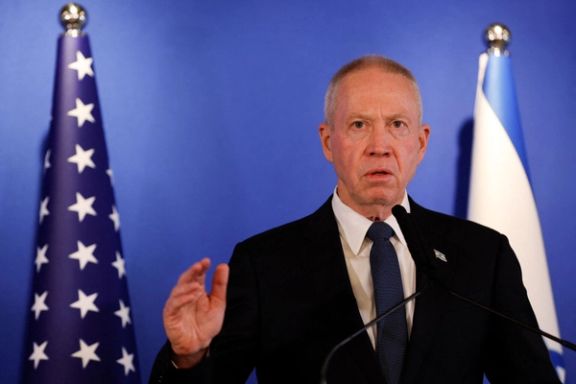
Israeli Defense Minister Yoav Gallant has said that Israel may have to form an alliance to be able to stand against Iran.

Israeli Defense Minister Yoav Gallant has said that Israel may have to form an alliance to be able to stand against Iran.
His comments come after the successful joint defense with US, UK and Jordanian air forces against a drone and missile assault by Iran overnight on April 13-14.
In a statement released on Sunday, Gallant detailed how the attack had been fought off with the help of the United States and other allied nations.
According to him, the aggression is a critical juncture for Israel to consider more collective security measures.
"We have an opportunity to establish a strategic alliance against this grave threat by Iran which is threatening to mount nuclear explosives on these missiles, which could be an extremely grave threat," he stated.
Earlier, Gallant outlined the scale of the attack on Israel, noting that "The State of Israel was attacked with hundreds of missiles and [unmanned aerial vehicles], and the [Israel Defense Forces] thwarted this attack in an impressive manner."
The minister stressed the importance of being prepared for any possible future scenarios.
Gallant's words came in a broader response from the Israel war cabinet, comprising himself, Prime Minister Benjamin Netanyahu, and Benny Gantz, which is tasked with deciding Israel's tactical response to the Iranian threat.
Speaking to the nation on Saturday night, Netanyahu highlighted Israel's preparedness to face Iran in direct combat and noted that they were ready for “any scenario, defensively and offensively.”
"Whoever harms us, we will harm them. We will defend ourselves against any threat and will do so level-headedly and with determination," he noted.

Israeli President Isaac Herzog characterized Iran's recent attack on Israel as a "declaration of war," highlighting the gravity of the situation.
"We were attacked last night from four corners of the Middle East with proxies shooting at us, firing missiles and ballistic missiles, drones and cruise missiles."
"This is like a real war. I mean, this is a declaration of war," he said, before adding that Israel would exercise restraint.
As tensions continue to escalate between Israel and Iran, the situation remains precarious, with the specter of conflict looming large.
In a bold statement underscoring the escalating tensions between Israel and Iran, Israel Defense Forces (IDF) spokesperson Daniel Hagari admonished Iran's regime for disseminating falsehoods and squandering precious resources.
Speaking in an interview with Iran International, Hagari urged the Iranian government to cease its propagation of lies and fabricated videos aimed at the Iranian populace.
Hagari minced no words as he accused the Iranian regime of wasting both money and resources, emphasizing that the regime's futile endeavors rendered hundreds of drones and missiles futile, ultimately consigning them to the metaphorical "garbage" heap.
Hagari's message wasn't confined solely to reproach; he extended a hand of solidarity and support to the Iranian people, affirming a shared commonality between them and the citizens of Israel. He emphasized that the true enemy of the Iranian people lay not with Israel but with their own oppressive regime.
"The people of Iran has a common enemy with Israel. It is the regime of Iran. You deserve better. You deserve freedom. Someone will hear your voice and we hear you in Israel. We hear you," Hagari added.
Hagari reaffirmed Israel's unwavering resolve to defend its sovereignty, emphasizing the IDF's preparedness to utilize its formidable capabilities.
Moreover, earlier today, revelations emerged that Israel's intended retaliatory strike was thwarted by the United States at the eleventh hour. According to an Israeli source cited by Iran International:
"The US prevented Israel from launching the attack it had planned in response to the Iranian strike 'at the last minute' on Saturday night."
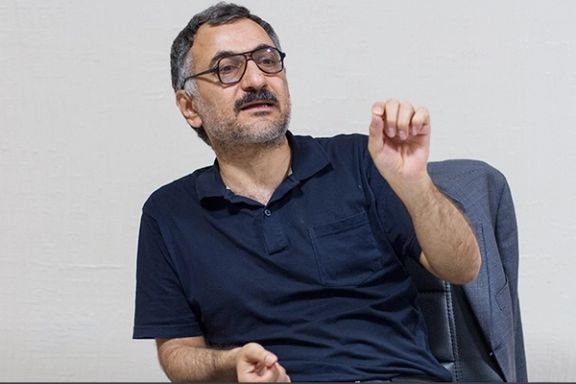
Saeed Laylaz, an Iranian 'reformist' commentator, warned that Iran might "test its first atomic bomb" in case the United States or Israel retaliate for the early Sunday missile and drone attack targeting Israel.
His comments contrast with the official Iranian position for years arguing that Tehran's pursuit of nuclear technology is for "purely peaceful purposes."
Laylaz, an economist, journalist, and professor at Shahid Beheshti University in Tehran, claimed the statement is a "clear warning to Americans." He also underlined the fact that “Iran’s hands are never tied when it comes to national security issues."
His comments are far distanced from the regime’s repeated assurances to the world, anchored in the "nuclear fatwa" of the Supreme Leader, that Iran has no ambition to make nuclear weapons.
"We believe that besides nuclear weapons, other types of weapons of mass destruction such as chemical and biological weapons also pose a serious threat to humanity. The Iranian nation … feels more than any other nation the danger that is caused by the production and stockpiling of such weapons… We consider the use of such weapons as haram [forbidden] and believe that everyone must make efforts to secure humanity against this great disaster,” Khamenei said in a statement to the nuclear disarmament conference in 2010. However, many argue that this was not a fatwa, but a statement by a head of state.
The fatwa has been one of the central elements of Iran's defense, especially in its nuclear diplomacy, and most notably during the negotiations of the Joint Comprehensive Plan of Action (JCPOA) from 2013 to 2015.
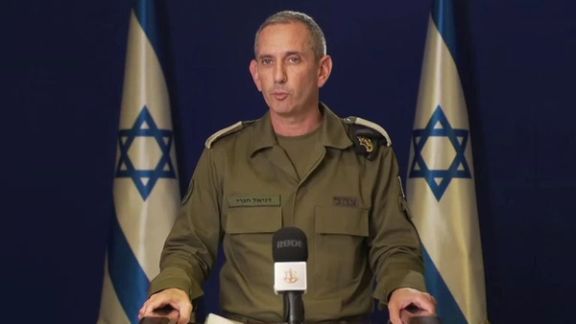
Israeli military spokesperson Daniel Hagari told Iran International that the Islamic Republic invested heavily on its missiles and proxy forces but all failed against Israel’s military might and its coalition of partners.
The attack exposed Iran's true colors, he said in an exclusive interview, underlining that when Tehran’s proxies failed to achieve their objectives, the Iranian regime resorted to a direct assault.
Hagari highlighted that 99 percent of Iran’s projectiles were intercepted, debunking the Islamic Republic’s claims about hitting targets in Israel. Hagari also pointed out that the only place Iran’s ballistic missiles reached was Nevatim Airbase, where “a small number” of missiles caused “a minor damage” and did not even halt the operation of the base. “We can show it live” that Israeli planes are departing from the base patrolling Israel’s airspace.
“Zero UAVs and cruise missiles entered Israel,” he said, confirming earlier reports that most of the projectiles had been intercepted before entering the Israeli airspace. “Only a handful of ballistic missiles” hit the Nevatim airbase and its surrounding areas. “This is all their capability.”
Differentiating between “the regime in Iran” and “the people of Iran,” Hagari said that the IRGC and its extraterritorial Quds force wasted a significant amount of Iranians' money on the attack. He further criticized Iran's misuse of resources, stating that the attack again highlighted how Iranian public funds are squandered on terrorism, rather than being invested in the nation's development and its citizens' well-being.
He also addressed the propaganda campaign by the regime about the attack, calling on the Islamic Republic not to "sell lies and fake videos to the people of Iran.” “You are wasting their money and their resources.”
The Iranian people know that the regime is lying, he pointed that, adding that the building targeted in Iran's embassy compound in Damascus was a base for the IRGC-Quds Force and not a diplomatic building. How come no diplomat was killed in the attack on the so-called consulate building, he asked.
Israel and all its partners are ready to defend Israel against Iran and its proxy forces, he said. “The strategic partnership between Israel and the US is ironclad,” he highlighted, referring to US President Joe Biden’s remarks.
Israel’s response will be demonstrably forceful, Hagari asserted, emphasizing action over rhetoric. "We will take all necessary measures to safeguard our national interests and the security of the Israeli people."
Iran launched more than 350 drones, ballistic and cruise missiles towards Israel Saturday/Sunday night local time, marking the first such attack in the history of the Islamic Republic.
Although the massive strike launched mostly from inside Iranian territory caused little damage, the risk of an Israeli response escalating into a full-blown war looms large.
The attack was anticipated given Iran's threats and warnings to retaliate against Israel's targeting of Iran’s consulate in Damascus on April 1. Intelligence assessments had predicted an imminent and significant strike.
Follow developments on Iran International's Live coverage of ongoing tensions between Iran and Israel.
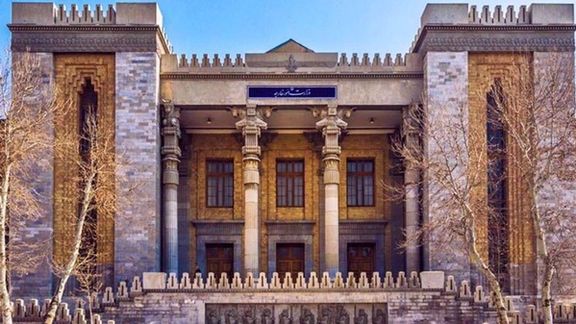
The Iranian foreign ministry summoned the ambassadors of Britain, France, and Germany over their condemnation of the regime's drone and missile strikes on Israel.
The ministry's director for western Europe, Majid Nili Ahmadabadi, accused the three European states of showing "double standards", referring to their rejection of a Russian draft at the UN Security Council to condemn Israel over its alleged airstrike on an Iranian consulate in Syria earlier this month.
"Iran's military action against the Zionist regime's [Israeli] bases is well within the framework of the right to legitimate defense stipulated in Article 51 of the United Nations Charter and it is in response to a series of crimes, including the recent attack on the embassy compound in Syria," the official told the Iranian Labor News Agency. The strike in Damascus killed two commanders and several other IRGC personnel.
The German Foreign Minister Annalena Baerbock responded quickly after the attacks were launched from Iran on Saturday night, the country's first direct strike towards Israel, claiming that the Iranian bombardment of over 350 projectiles towards the Jewish state had brought the Middle East "to the edge of a precipice". She said Tehran had "plunged an entire region into chaos".
French President Emmanuel Macron was also quick to condemn Iran’s drone and missile attack on Israel. “I condemn in the strongest terms the unprecedented attack launched by Iran,” he wrote on X. “I express my solidarity with the Israeli people and France's commitment to the security of Israel, our partners, and regional stability,” he added.
According to the Israeli military spokesman, France was also involved in the coalition helping thwart the Iranian onslaught. Daniel Hagari said France "has very good technology and jets and radars, and they were contributing in patrolling in airspace".
In the UK, Prime Minister Rishi Sunak revealed that British fighter jets had shot down Iranian drones. "I can confirm our planes did shoot down a number of Iranian attack drones," he said, underscoring that Britain had taken an active role in helping Israel and other allies push back the strikes.
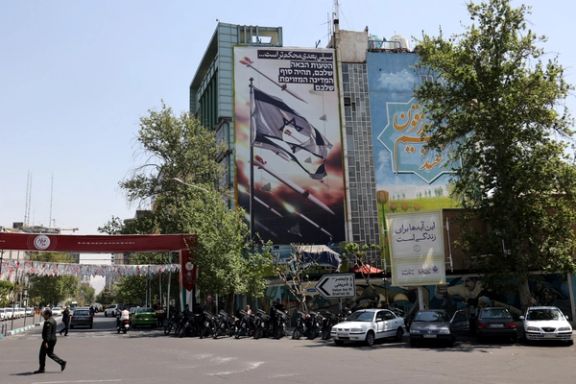
Reactions from authorized media commentators in Iran on Sunday to the attack on Israel were notably scarce, as they carefully avoided crossing any government red lines.
Typically, political pundits appearing in Iran’s government-controlled media speak before Ali Khamenei or the IRGC take a clear position on sensitive issues or make a decision. But when the decisions are made and actions are taken, they usually thread very carefully.
Military operations are one such area where dissenting opinions are rarely expressed. Consequently, after the IRGC's attack on Israel, voices of opposition were notably absent, with only statements from the IRGC and select reports from international media being disseminated. In such circumstances, pundits are constrained to voice agreement.
Insiders’ reaction
After 12 days of the regime's inaction following Israel’s attack on Quds Force members in Damascus, the predominant theme across all of the regime's propaganda outlets immediately after the drone and missile attacks was self-congratulation: “The regime is punishing the aggressor”, “the necessary warnings have been given to the United States”, and “the punishment is due”. These mirror Khamenei words and position taken by the IRG.
Apparently, to keep everyone in line, the hardliner Kayhan Daily, controlled by the Supreme Leader’s office labeled anyone who dared to speak about regional peace and stability, “a traitor.”
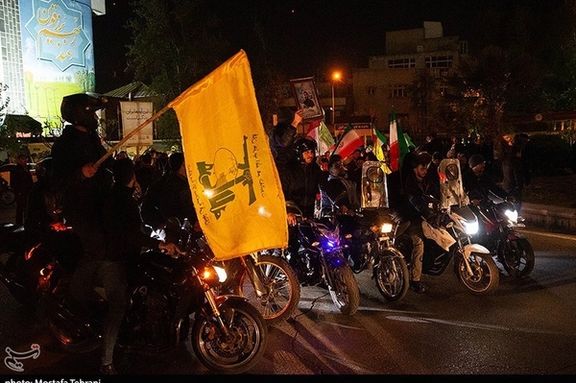
To show the power of the IRGC, headlines such as "Israel was put on full alert", "Zero hour of punishment", "Zionists' fear of Iran's response", "Israelis are confused and dumbfounded, they have no confidence to fight", "Iranian drones do not give a chance to escape," in Government and quasi-government newspapers and websites were published. These headlines were responding to general public ridicule and lack of trust in any official claims.
Regime-organized rallies were launched, soon after the attack commenced, in cities such as Tehran, Qom, and Gorgan to show public support for the IRGC and Khamenei, but the number of participants was in the range of tens to hundreds of people. In these gatherings, small crowds chanted slogans likening the war against Israel to the historical conflict between the Prophet of Islam and the First Imam of Shias against the Jews during the early days of Islam.
People’s reactions
The initial response of ordinary people in the streets and bazaars of major cities was to queue up at gas stations to refuel their cars. The primary and immediate concern was the potential disruption in daily life due to subsequent shortages. Similar lines were witnessed during the Iran-Iraq war following air strikes.
In the responses seen on social media, three significant trends emerged: expressions of support for Israel, public skepticism towards official news, and ridicule directed at IRGC weapons used in the attack. One user, writing in Farsi, stated, "My country is fighting with another country, and I want that country to win." Iranians on social platforms also utilized hashtags like "Beat them, Israel!" and "Thank you, Israel."
In reaction to the criticism following the attack on Israel, the Revolutionary Guards Intelligence Organization issued a notice urging citizens to report any online support for Israel, treating it as a "criminal" offense. The amount of pro-Israel sentiment exceeded expectations for the IRGC intelligence unit.
Comments online referred to the Islamic Republic's operation as "Fake Al-Assad," a mocking reference to the previously announced retaliation for the killing of Qassem Soleimani, when Iran launched ballistic missiles at the Ain al-Asad military base in Iraq hosting US troops in 2020.
Videos circulated online showed individuals examining crashed drones in various regions of Iran, ridiculing the regime's military institutions and weaponry.






